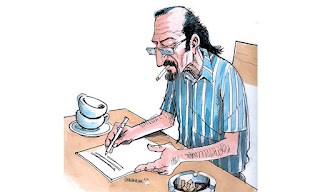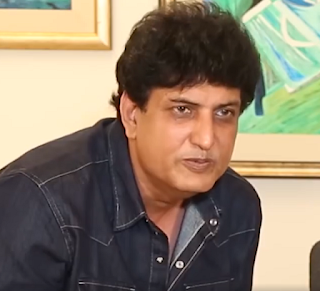Satire: Diary of a Pakistani journalist
Dear Second-hand Diary ...
Because I can’t afford a new one, as today is the end of
another month where I haven’t been paid. Sometimes my ex-wife asks me why I
never got a proper job. All your friends are making a lot more money than you,
she used to say, but you had to become a journalist. I told her I can’t help it
— I have a passion for the truth, and the truth is I wasn’t qualified to do
anything else. The job is demanding. My editor says I should listen to a lot of
people without giving my own opinion, but as a Pakistani, that is impossible to
do.
The job is dangerous too. I have to go to conflict areas,
such as Lyari, Waziristan and the National Assembly. Covering the Parliament is
not fun, unless I can cover it in tarpaulin.
Sometimes I have to go and ask people how it felt being trapped
under debris or caught in a bomb blast. To my surprise, none of them say it was
‘kind of nice, actually’. Other times, I have to revisit sites of great tragedy
and do live shots about dead people. Just today I was sent to a dark, desolate
place with nicotine addicts sleeping on the floor because they don’t have homes
or hope. I believe it was called a ‘press club’.
Newsrooms are the best. You get to work late, give up all
pretences of a social life and make front-page news, or as most publications
prefer it, make up front page news. I need to get regular vitamin shots because
I haven’t seen the sun in a year. I get one day off in a week, and usually get
called in for that when Imran Khan announces another dharna. I think I have a
family, but I can’t remember their names. They only find out I’m alive when I
file a story.
I regularly get arrested by cops, stopped at checkpoints and
am refused entry into public offices — and that’s just on my way to work. I
risk my life and reputation to publish stories so talk-show hosts can continue
to make all the money.
Last year, I was shot at during a shutter-down protest,
tear-gassed at a political rally and beaten up at a summer lawn sale. It’s much
safer to cover sectarian leaders and militants. This year, I had my shirt torn
and hair pulled at the national budget conference. On average, my cameraman’s
equipment is broken twice a month — the biggest office expenditure is on
gadgets.
Working for an English daily, my job description is to help
white journalists understand conservative Pakistan. The dream is to be a
correspondent for a foreign news agency one day, but my degree from Colombo
University instead of Columbia means I might be a fixer for the rest of my
life.
Today, I woke up to 100 messages on Twitter — 99 asking me
how much RAW pays me for my articles. The ultimate challenge is to do a story
on civil-military relations without people asking for your deportation. This
week, I received only 10 death threats online; there must be exams in computer
engineering colleges.
In Pakistan, we don’t just have credible journalists, we
have incredible journalists.
One of our peers was recently put on the Exit Control List
over a leaked story. Pakistan is the only country where punishment is not
exile, but being forced to stay here. They’re still investigating it: one
minister has lost his job and several others have been named in the terrible
leak, which increasingly sounds like the government has a serious bladder
problem.
But this story isn’t just a problem for the government, it’s
also a problem for us. I used to think getting beaten up by cops or ending up
in prison was how one became a renowned journalist; now I have to get on the
Exit Control List for my badge of honour.
People say our stories aren’t reliably sourced, but sourcing
is difficult in this country. If you ask a person the same thing twice, you’ll
get three different answers. I can’t verify military sources; I can’t verify
government sources; I can’t even verify the sources of my own income. Yes,
sometimes I find a lifafa on my desk. Usually it’s just the new issue of Hilal
magazine.
In Pakistan, everyone speaks on the condition of anonymity,
wishing not to be named. If they really wished not to be named, they should
have told their parents that. Just last week an official, on the condition of
anonymity, told me to get lost.
The government now says journalism is the biggest threat to
national security since the Taliban. There needs to be a new National Action
Plan against media houses. There needs to be a Zarb-e-Azb in Karachi’s Saddar
area. Somebody should investigate investigative journalism.
Yours anonymously,
Sohail Almedia
Published in Herald
Apr 17,
2017




Comments
Post a Comment